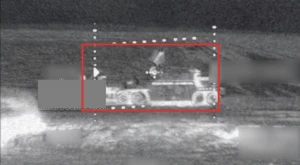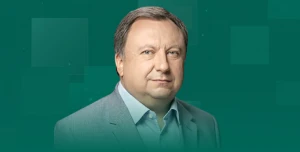
Why Kuban should be separate from Russia: Activist of Kuban independence movement explains
Activist Dmitry Dorovskikh supports Zelenskyy's Decree on Ukraine's historical territories, advocates for Kuban independence from Moscow in the context of Russia's inevitable decolonization
Dmitry Dorovskikh is a Russian citizen but identifies himself as a Kuban native. He is a representative of the Malynovyi Klyn (Raspberry Wedge) Kuban independence movement, speaks Ukrainian, and anticipates the collapse of Russian imperialism.
The conversation with Dmytri took place in the Comment program on the Espreso YouTube channel. Below is the text version that Olga Rura worked on.
On January 22, Ukraine's Unity Day, President Volodymyr Zelenskyy signed a decree "On the territories of the Russian Federation historically inhabited by Ukrainians." How do you assess this decision, since it lacks specific details? [ed. The President only instructed the Cabinet of Ministers of Ukraine to develop an action plan to preserve the national identity of Ukrainians in Russia]
As a lawyer by education, I can say that the lack of certain details is not critical. I am glad that this issue has finally been raised at the official level. If until now there were private initiatives both in Ukraine and in the regions mentioned in the decree, now it is enshrined in law.
If this matter moves forward, it will be a huge plus in the information warfare, which the Kremlin is unfortunately winning today.
Russian politicians, even until 2014, brazenly demonstrated their disregard for Crimea, Donbas, and Odesa as Ukrainian territories. The Moscow Mayor Yuri Luzhkov visited Sevastopol, stating, “Does Ukraine have a basis? There is no basis for claiming Crimea and Sevastopol.” Ukrainian politicians, in contrast, have never behaved so arrogantly, never declared rights to any Russian land. No Ukrainian politician has ever traveled to Rostov and claimed it to be Ukraine.
Ukraine has always adhered to international agreements, unlike Russia, which has not played by the rules and continues to do so. It is precisely because of this systematic violation of international law that Russia is now winning the information war against Ukraine, the West, and states that are guided by the ideas of democracy and freedom.
Unfortunately, both Ukraine and Russian opposition forces missed the moment when Russia resumed its course toward imperialism in the 1990s. That is, the criminals who were not punished then continue their activities now.
Although you were born and raised in Russia, you understand Ukrainian and can communicate in it. Where exactly and under what conditions did you learn the language?
I was born in Krasnodar, and our family lived in the village of Loris. I went to a Moscow school where I studied in Russian. I learned basic Ukrainian with my grandmother. In general, our family, like many families in eastern Ukraine, spoke surzhyk. After 2014, I started studying more on my own to improve my language level: I watched and read materials in Ukrainian.
The issue of self-identification for me is multilevel. I have Cossack, that is, Ukrainian, Russian, and Jewish roots. Ukrainian culture in its Kuban Cossack form is closer to me. If we talk about the political nation, I am a Kuban.
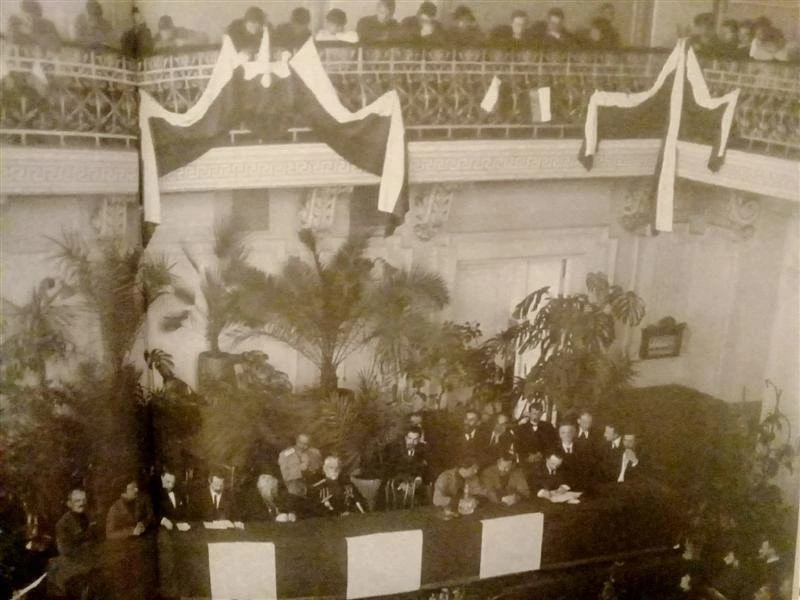 A meeting of the Kuban Legislative Council. 1919. Photo: Local history
A meeting of the Kuban Legislative Council. 1919. Photo: Local history
Is the idea of Kuban independence new or does it have some historical basis?
Kuban has a history of statehood. Approximately 100 years ago, the Kuban People's Republic declared its independence and existed for about two years before being occupied by Russia.
The Kuban People's Republic negotiated with the Ukrainian People's Republic to establish a federal union. In the 1990s, the regional authorities of Kuban also speculated around the idea of autonomy, and there were initiatives to create television or separate channels in the so-called "balachka" (a dialect of Ukrainian - ed.).
Are you the only group that advocates for Kuban's independence?
We are not the only group - there are several groups that differ in their political views. We are most likely liberal, but there are also more conservative ones who are in favor of supporting the Cossacks.
In addition to Ukrainian Cossack organizations and groups, which vary in size from three to several hundred members, there are also organizations of other nationalities, such as Cherkess, which have a well-developed network. We are trying to cooperate, despite disputes in the past, for a common cause - the liberation of our homeland.
We, the people of Kuban, have a subconscious desire for independence. For example, we feel a difference between Kuban, our land, and Moscow, which is not our home. In times of political or military unrest, support for the idea of independence will increase.
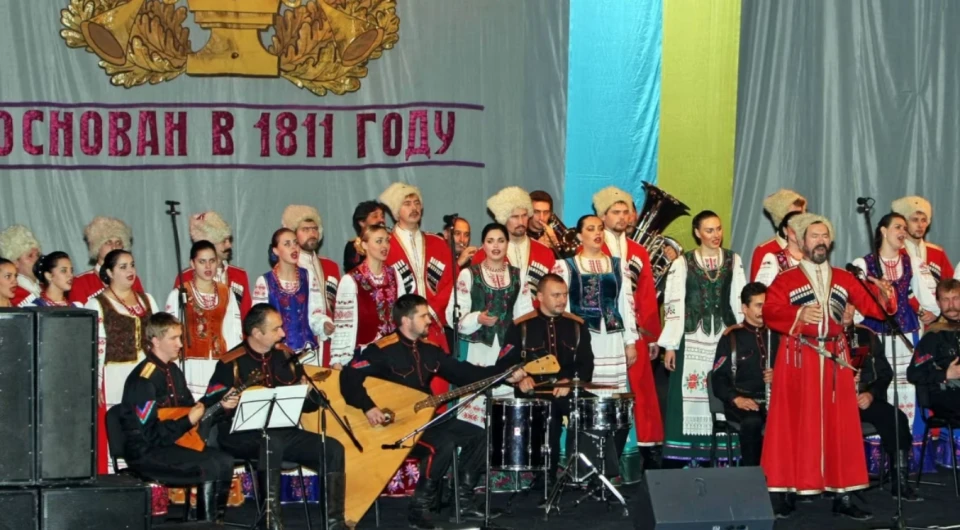 The Kuban Cossack Choir in Ivano-Frankivsk in 2007. Currently, the choir members actively support Putin and his actions in Ukraine. Photo: Radio Liberty
The Kuban Cossack Choir in Ivano-Frankivsk in 2007. Currently, the choir members actively support Putin and his actions in Ukraine. Photo: Radio Liberty
What is happening to Ukrainians in Russia?
This is a multi-level assimilation. Someone loses the understanding of belonging to their people, someone abandons their roots through propaganda. A centralized policy that has been pursued since the days of the Russian Empire plays a major role. For example, at the level of documentation in Kuban, since the end of the 19th century, most people have been recorded as Russian in the nationality column.
(Valentyn Sperkach's documentary about the Kuban Cossacks (1992) shows the problem of the total and planned russification of the Kuban Cossacks, namely the Ukrainian Cossacks transformation into "Russians" in their passports, despite the different reality. You can also hear the Kuban dialect in it - ed.)
Ukrainians, as well as Belarusians, are much easier to assimilate because of language, faith, and relative cultural proximity, unlike other peoples.
How should knowledge about the independent Kuban be spread in Russia itself: by taking to the streets with peaceful protests, distributing information materials, or choosing other methods?
There is no point in taking to the streets now. At the moment, we can only talk about underground methods of struggle and help in spreading information. We have a lot of supporters who act in a non-public way. As soon as we see that the Russian authorities are weakening, we will start using other measures.
How could Ukraine help your movement?
Any information support is important to us. As for diplomatic support, we need the highest state level to perceive Kuban as a territory occupied by Russia. Zelenskyy's decree meets our needs.
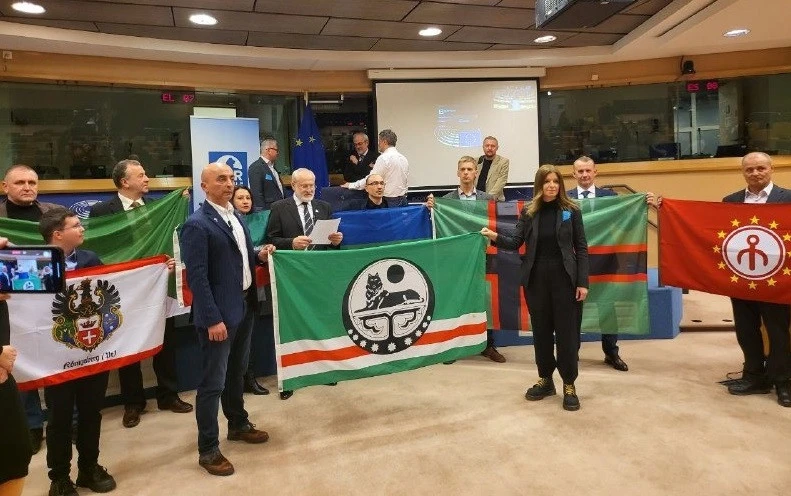 V Forum of the Free Peoples of Post-Soviet Europe, 31.01.2023, Brussels, European Parliament. Photo: freenationsrf.org
V Forum of the Free Peoples of Post-Soviet Europe, 31.01.2023, Brussels, European Parliament. Photo: freenationsrf.org
You also speak at various international platforms, including the Free Peoples Forum of Post-Russia, where representatives of various peoples enslaved by the Kremlin share their vision of the future. What exactly do you talk about there?
First of all, this is part of information warfare. The international community has long perceived Russia as a monolith, not a colonial empire. Through such events, we try to convey our ideas. It also helps to bring information to our regions.
One more goal of such gatherings is to coordinate the independent forces. For example, we organized the Kuban/Cherkessia Coordination Council. Together with representatives of other Cossack Kuban movements and Circassian representatives, we discuss an action plan for the future.
- News














